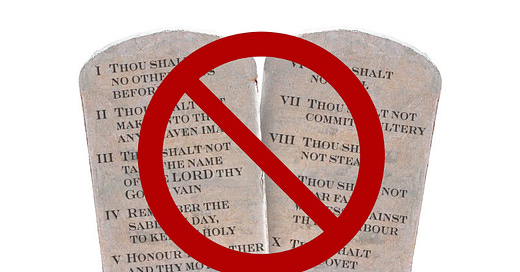Louisiana Ten Commandments law faces court challenge from parents and clergy
Americans United for the Separation of Church and State, the Freedom From Religion Foundation, and offices of the ACLU join to oppose the new law.
As anticipated, a group of public school parents and clergy have filed a lawsuit against Louisiana’s new law mandating the display of the Ten Commandments in public schools.
The Ten Commandments (also known as the Decalogue) are 10 laws recorded in the Bible in Exodus 20:1-17 and Deuteronomy 5:6-21 that God gave to the nation of Israel shortly after the exodus from Egypt. The first four commandments deal with our relationship with God. The last six commandments deal with our relationships with one another.
The lawsuit was filed on June 24 by Americans United for the Separation of Church and State, the Freedom From Religion Foundation, and offices of the ACLU, the complaint alleges that the law unfairly privileges a specific version of Christian scripture and impinges on the rights of nonreligious and those of other faiths, according to media reports.
The complaint highlights the Louisiana bill signed into law last week that requires public schools to post copies of the Ten Commandments in classrooms that are paid for by donations. The plaintiffs argue that the law violates their First Amendment right to religious freedom and the U.S. Constitution’s prohibition against establishing a state religion.
Jeff Sims, a Presbyterian Church (USA) minister and a plaintiff in the case, criticized the Louisiana law as sending a message that people of certain religious denominations are superior to others. The complaint notes that no federal court has upheld the display of the Ten Commandments in a public school setting.
The complaint argues that by mandating the display of the Ten Commandments, Louisiana effectively requires a specific, state-approved version of the scripture to be posted, taking sides on theological questions regarding the correct content and meaning of the Decalogue. It notes the diversity of opinion regarding the scripture in question, including a wide array of religious traditions that do ascribe to the Ten Commandments, but their translation, numbering, and wording of the passage varies widely.
Rachel Laser, head of Americans United for the Separation of Church and State, said other states are planning to introduce bills similar to the Louisiana law as “Christian nationalism” grows across the United States. She said Texas has already passed a law allowing public schools to enlist chaplains. Laser said the Christian nationalist laws violate the religious freedom principles that are core to the country’s founding, which allow everyone to live as themselves and believe as they choose, so long as they don't harm others.
The legal team behind the effort expressed confidence they would prevail if the case rises to the U.S. Supreme Court.
Patrick Elliott, legal director for the Freedom From Religion Foundation, believes the issues in the case are already covered by clear Supreme Court precedent and that justices may not even take up the case. Supporters of the law have argued otherwise, with Louisiana Gov. Jeff Landry – who signed the bill into law – reportedly expressing excitement to be sued. Landry, a Roman Catholic, is supported by numerous lawmakers in Louisiana, including State Rep. Dodie Horton, a Republican and Southern Baptist from Haughton.
Related:




